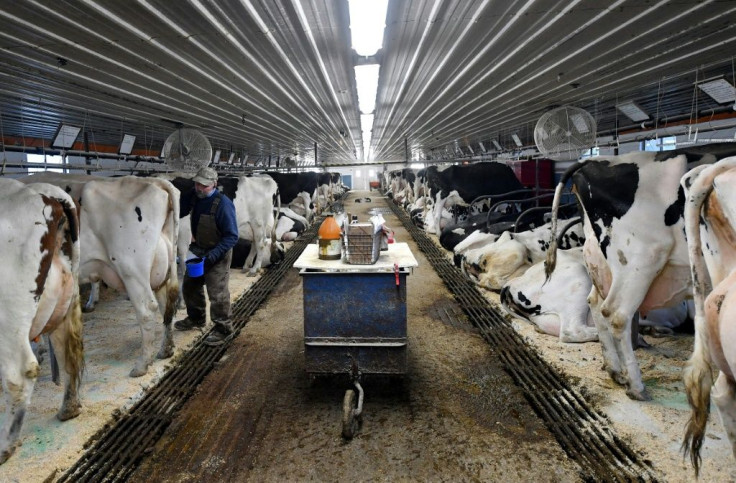Cheap Beef And Wasted Milk: US Agriculture Struggles With Virus

Milk dumped in fields and cattle prices plunging even as steaks stay expensive: the coronavirus pandemic is hitting American farmers hard.
With industries from restaurants to department stores forced to close, farmers haven't stopped working, but are finding demand unpredictable and supply chains are struggling to adapt to the new conditions.
Dairy farmers often struggle to store excess production, and Brenda Cochran, who runs a 70-cow dairy farm in Pennsylvania along with her husband, said she was ordered twice recently to dump her milk.
In line with environmental regulations, the couple loaded their excess milk into a manure spreader and dumped it on their fields.
"Dumping our milk and seeing, at the same time, the images in the press of empty dairy shelves make us angry," Cochran said.
"We have the same COVID-19 anxiety everyone else has," and after years of very low dairy low prices, Cochran said the couple is also facing "this long-term anxiety every month of not being able to meet our bills."
The country's main farmers union has warned that virus-induced trouble for agriculture in the world's largest economy will be widespread.
"Shuttered schools, universities, restaurants, bars and cafeterias are no longer buying milk, meat, fruits, vegetables and other food, causing a downward spiral in crop and livestock prices," the American Farm Bureau said.
The beef industry is struggling with a paradox: prices for live cattle listed in Chicago have fallen by about 30 percent since mid-January, but steak prices have increased in stores.
"On one side, you had the futures market that was worried about a drop in demand because of restaurants closing," Mike Zuzolo of Global Commodity Analytics said in explaining the discrepancy.
"Meanwhile in the cash market, the breaking of the supply chain has created perturbations all around and we started to see empty shelves."
The problem has grown so severe that the National Cattlemen's Beef Association has asked President Donald Trump to investigate.
The president tweeted on Thursday that he has directed the Secretary of Agriculture "to expedite help to our farmers, especially to the smaller farmers who are hurting right now."
"We will always be there for our Great Farmers, Cattlemen, Ranchers, and Producers!" said Trump, who is facing a tight re-election battle in November and counting on farmers to renew their support.
Intermediaries are also struggling. Meat giant Tyson Foods has had to suspend operations at a pork factory in Iowa after detecting more than 20 cases of COVID-19 among its employees.
Cereal farmers are preparing for planting season, hoping to benefit from a lull in the trade war between China and the United States after a truce signed in mid-January but instead they're facing tough times.
Containment measures to stop the virus have led to a drop in gasoline demand, including biofuel made from ethanol.
About a third of corn production in the US is used for ethanol and, as a result, corn prices have fallen by 15 percent since mid-January.
Cotton prices have meanwhile plunged to their lowest level in 11 years, which experts at Commerzbank blame on a drop in spending on new clothes, factory closures in garment-producing countries hit by the virus and a shift towards synthetic fibers that have grown cheaper with oil prices low.
For Cochran, the only good thing that could come from all this is a re-organization of supply chains.
"We have the right to fresh local foods," she said. "And not just in food, but also in other basics like... medical goods."
© Copyright AFP 2024. All rights reserved.





















